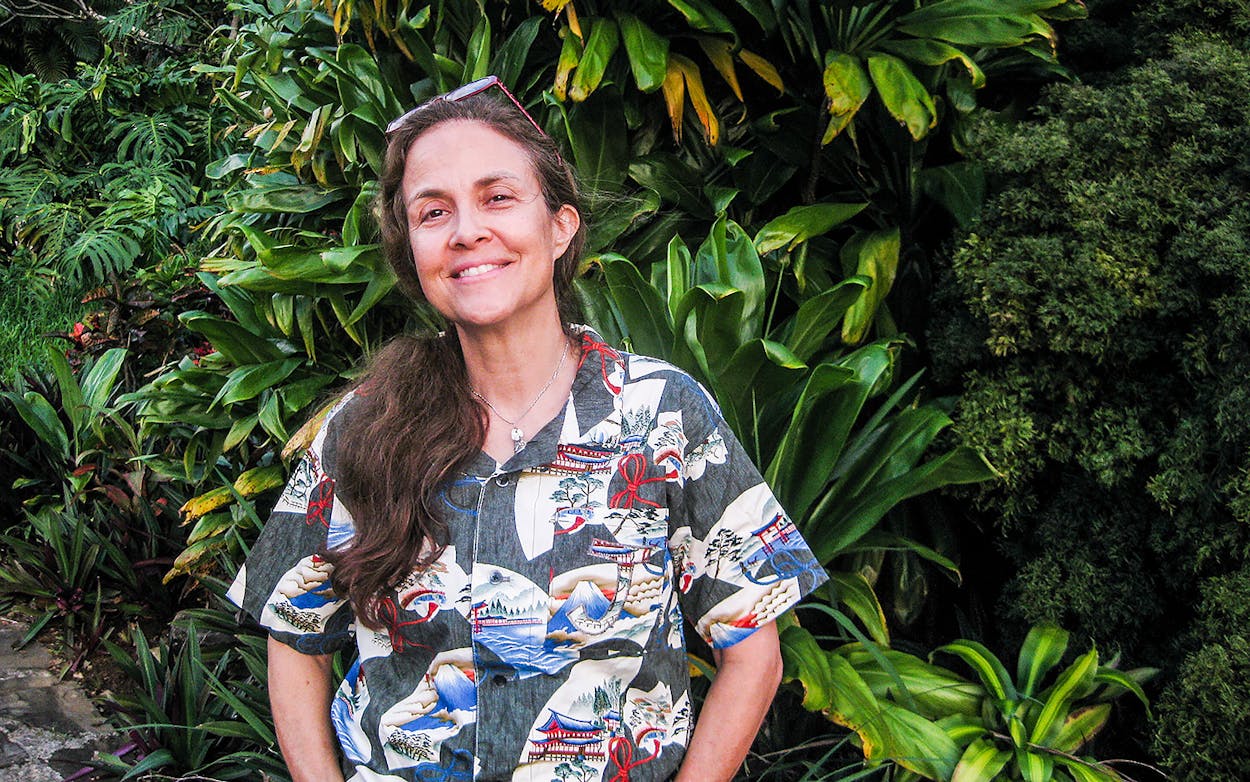“Poetry lives everywhere,” says poet Naomi Shihab Nye, who was named the Young People’s Poet Laureate by the Poetry Foundation today. “Whether it’s in a small village where no one has ever said the word poetry, or in an elementary school classroom—there’s no place that poetry doesn’t live.”
If anyone can make that claim, it’s Nye. The Palestinian-American writer, who has been based in San Antonio for years, has dedicated the majority of her decades-long career to working with young writers across the world. Starting in 1974, she spent fifteen years traveling across Texas as a visiting writer with the Texas Commission on the Arts. In inner-city schools or rural communities, she saw up close the potential her students had to create works of poetry and draw on their own experiences.
It’s also something she knew firsthand. From the time she began writing at six years old, Nye drew upon the deep well of her bicultural upbringing to create her first pieces and many that followed. Her love of writing was shaped by her father’s stories of his native Palestine or the books and poems her mother would read to her before she could make them out herself.
By the time she learned to write, she remembers being gripped by the urge to jot down a poem. The first was a four-line piece she wrote in first grade that her teacher later posted in the hallway. “I was overcome with the feeling that I needed to do this always,” she says.
Nye has followed that passion for four decades, working as an editor, anthologist, songwriter, and author of eighteen novels, short stories, and poetry books for adult and young adult audiences.
Since 2006, the Young People’s Poet Laureate honor has been awarded every other year to living writers who have dedicated their careers to writing poetry for young readers. According to Katherine Litwin, director of the Poetry Foundation, Nye is the first Arab-American to receive the honor. As Nye begins her term, she is particularly passionate about bringing poetry to rural areas that aren’t often a priority for visiting writers. Through Nye’s efforts, Litwin says she hopes a new generation of young adults are exposed to her work. “Her writing is so warm and accessible—it can be funny and also very sophisticated,” Litwin said. “It never talks down to the reader, and that is what I hope young people will receive from hearing her.”
From her home in San Antonio’s historic King William district, Nye recalls her early years in and around St. Louis, Missouri. There, she distinctly remembers her father, journalist Aziz Shihab, standing out as the only Arab in the area. His memories were different, the food he cooked was different—even the music he’d put on in their house was different than what she experienced with her friends.
She relished those differences, realizing then that if she didn’t quite feel like she belonged anywhere, she could belong everywhere. From her perch as a citizen of the world, and a self-described old soul, she sat back while other kids played, observing the way they would interact with each other and developing an appetite for the little details that would go on to shape her writing.
Her freshman year of high school, her family uprooted to Jerusalem—one year before the Six-Day War. Nye remembers being eager to finally taste and experience the world her father had described to her and her younger brother for so long, and quickly realizing how different things were. Nye still remembers being tear-gassed with her grandmother and having soldiers point their weapons at her and her relatives as they passed. She watched tanks roll into her grandmother’s refugee community, destroying her family’s olive trees.
To this day, Nye hates conflict, but the things she witnessed that year and in subsequent visits back to Jerusalem have informed much of her work. In her latest book, The Tiny Journalist, she writes several poems to Janna Jihad, a 13-year-old amateur Palestinian journalist, who began documenting incidents of violence against Palestinians on Facebook, Twitter, and Instagram six years ago.
Throughout the book, Nye draws on the experiences of children like Janna, while also mixing in experiences from her life as well as her family’s. In her poem “Separation Wall,” Nye writes, “I ask my grandmother if there was ever a time// she felt like a normal person every day,/ not in danger, and she thinks for as long// as it takes a sun to set and says, Yes./ I always feel like a normal person.// They just don’t see me as one.”
Shortly after the Six-Day War, Nye’s family left Jerusalem for San Antonio. Since 1967, Nye has made a home for herself there. It’s the place where she attended college, at Trinity University, and where she and her husband, photographer Michael Nye, raised their son Madison.
It’s also where Nye has helped shape generations of writers over the years. One of her former students, journalist and author John Phillip Santos, first met Nye in his English class at Churchill High School. At the time, Nye was a recent Trinity graduate and had just began her tenure as a visiting writer with the Texas Commission on the Arts.
The two were only four years apart in age, but Santos credits Nye with sparking his creative passion and helping him realize his own voice.
“Just about every poet I know in San Antonio had contact with Naomi at some point,” Santos says. “That was her mission worldwide, to help awaken an audacity within us and experience the joy of seeing your work printed out for the first time. Her unique voice and her perspective—it put our city on the map.”
- More About:
- Books
- San Antonio








